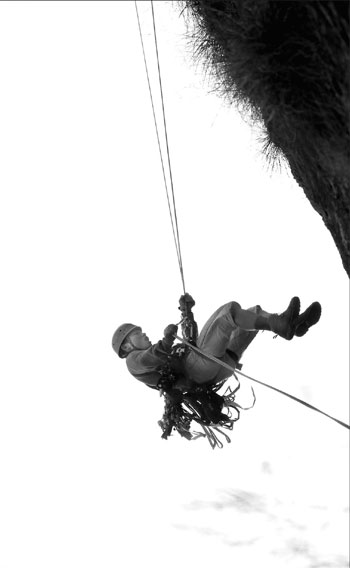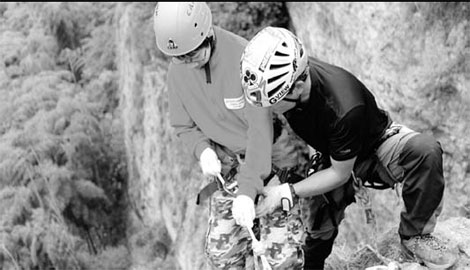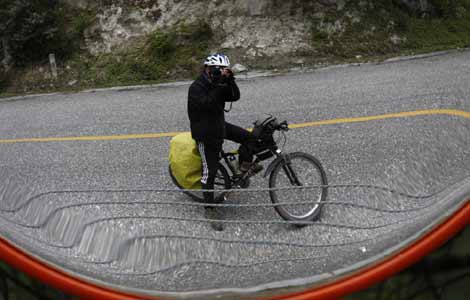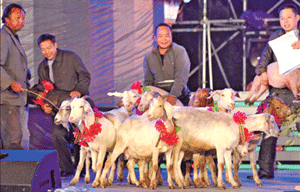The Great outdoors beckons
Updated: 2011-10-01 09:25
By Wu Yiyao (China Daily)
|
|||||||||
More than 90 percent of respondents in a recent poll said they will travel during the National Day break, according to a report by China Tourism News.
But whether one is trekking, hiking or gearing up for a self-driven tour, it's important to bear safety in mind, said outdoor rescue experts. Some 92 percent of 3,530 people surveyed said they will enjoy the outdoors during the first week of October. Nearly 60 percent of the respondents said they will go outside their provinces, and some 70 percent said they will take an independent tour.
 |
"Independent travel gives vacationers more freedom to explore places and things that they are interested in. As travelers become more experienced, the independent market is developing at a steady pace," said Chen Xu, a travel agent with Lijiang Travel Agency in Shanghai.
"I want to explore the beauty of nature with my friends. In this way, we can release the pressure of daily life and work," said Shao Xiaobing, a traveler from Ningbo, East China's Zhejiang province.
In Shanghai alone, more than 50 outdoor activities have been registered, and 200 others that have not been registered are organizing expeditions.
More than 300,000 people have participated in mountain trekking, according to the Shanghai Mountaineering Association.
Freedom vs risk
The other side of freedom, however, is risk.
"Fun, excitement and joy are important, but please bear in mind that safety is the first priority," said Gu Ming, a guide with the Chinese Mountaineering Association.
A veteran of outdoor activities with more than 15 years of experience, Gu said he had been trapped in dangerous situations and received injuries in his early days of pursuing adventure.
A lack of preparation, overconfidence and underestimation of risks can lead to danger, Gu said.
One myth of being prepared is simply to "buy expensive equipment", as if cost was the same as reliability.
"It is true that equipment is important, and we love quality things, but the point is not to buy luxuries and rely on them to save your life, if you do not know how to utilize them correctly," Gu said.
Gu has some tips for purchasing equipment. He said it's important to understand the multiple functions of any item and practice using them before paying.
Also, it's smart to avoid buying many items that can have duplicating functions yet still leave loopholes. Some simple gadgets can be very helpful if used properly.
Finding an experienced team leader and a reliable local guide is a key part of preparation.
"Beginners usually do not know what to pack and what to leave. Despite checklists you can find online, the equipment needed can vary from one destination to another," said Gu.
For example, drugs, balms and even bed netting can be life-savers in areas where bugs thrive.
Adverse or suddenly changing weather can be dangerous, especially in mountains where rain and fog can mean low visibility and slippery roads.
Different mountain
"I have climbed Qingliang Mountain in East China's Zhejiang more than 100 times, but I have never experienced exactly the same weather. Every time I went there, the mountain was different," said Gu.
 |
|
Gu Ming (right), a guide with the Chinese Mountaineering Association, provides guidance for a young adventure tourist. Provided to China Daily |
In such cases, an experienced team leader or local guide can tell travelers what to bring and what dangers they could face.
Travelers may need to learn some tips by heart to be used in case of an emergency.
Experienced adventurers can be more likely to get into trouble. Beginners are quite cautious, as they are always aware of their lack of experience.
Usually, experienced guides who "know the ropes" in the area are in their mid-50s or 60s. They grew up in the local area and still work there, and they have experienced dangerous situations. They have survived using the knowledge and wisdom they accumulated over the years.
"If you are not sure who to follow, contact a local cadre. They are most likely to know and recommend a local guide with a good reputation," said Gu.
Beginners are advised to join a team made up mostly of experienced and helpful peers, said Gu.
An all-beginner team can be an overwhelming challenge for a team leader or guide, since many emergencies can occur at the same time but cannot be dealt with simultaneously.
Trust a must
Experienced adventurers, on the other hand, can help beginners to deal with problems on the road, such as giving them a hand when crossing a ditch, Gu said.
A Yuan, a program manager of Prodigy Cycling Club in Shanghai, said that trust must be established.
"Team leaders and guides may make a mistake, for example, choosing a difficult path for beginners.
"In such cases, team members must point out and communicate with the guide and team leader. Without trust, a team can fall apart," he said.
It is likely that some slight injuries may occur, such as bruises, twists and burns, and keeping calm will avoid making things worse, he added.
When facing danger, it is necessary to call for help. That could be a local rescue team contacted prior to departure, local police or the professional rescue team at a scenic spot, said Gu.
"Choosing the right people to call for rescue can boost the odds of survival. In many cases, people trapped in danger cannot give an accurate location.
"If they can describe their surroundings to those who know the local area well, things may be much easier," said Gu.
The experts said it's most important to remember that expeditions should be fun, not dangerous.
"Think twice if you are not sure if you are doing the right thing or if you can do it, such as climbing up a hill or crossing a river," said Gu.










